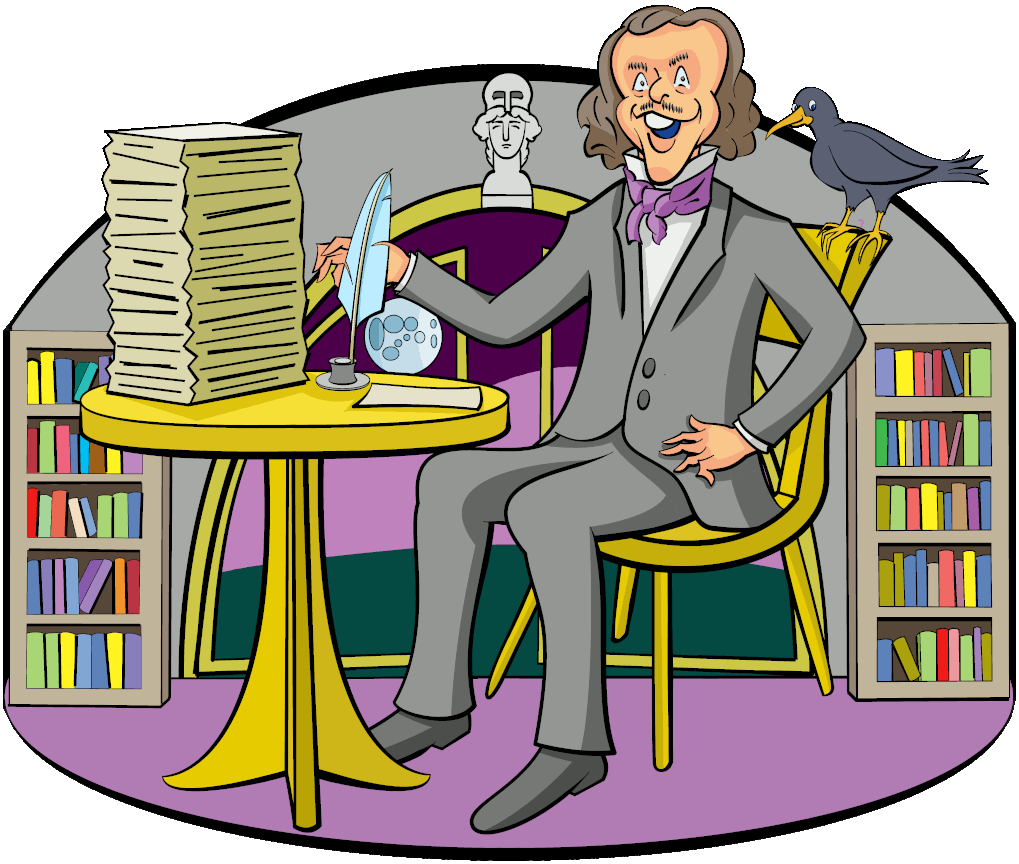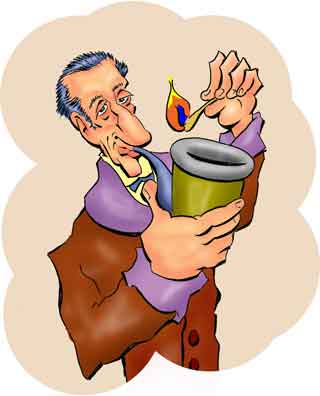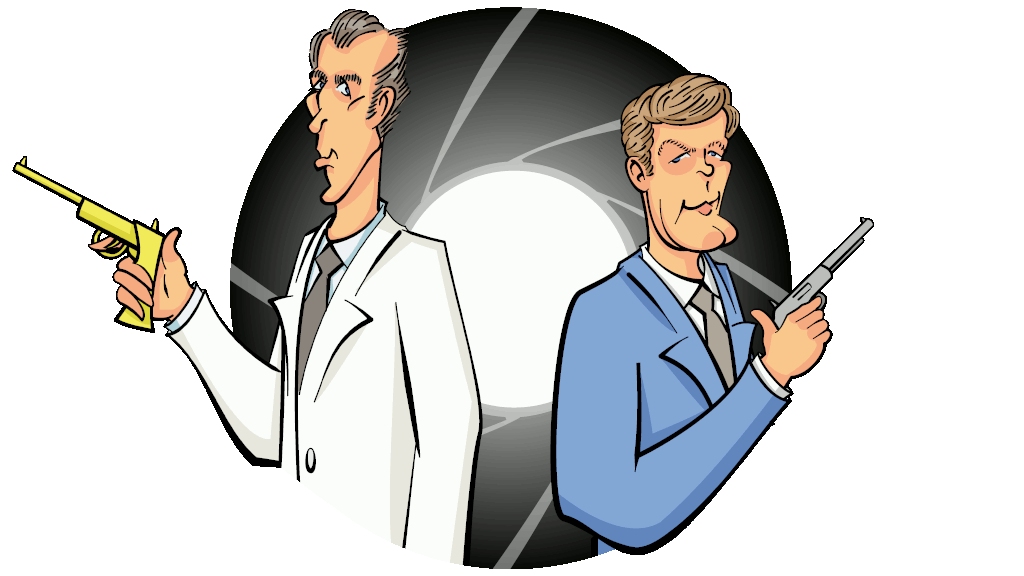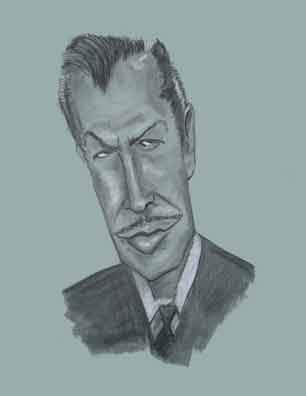John Astin
as
Edgar Allan Poe
(Click on the image to zoom out.)

By the fire-side I was sitting, and my wife she was a knitting,
And a new heel she was fitting, to a stocking half worn out:
Joe was in the chimney corner, spelling how young Jacky Horner
Ate the plum, which from the pie his greedy fingers had torn out -
Plum, from out the Christmas pie, by him so greedily torn out:
This our Josey was about.
- The Polecat
- Marmaduke Mar-Rhyme
The Quincy Whig
March 18, 1846.
When the poem "The Polecat" was written it was no doubt terribly funny. But much of the humor seems elusive to modern readers.
However, one of the earliest critics thought it was quite a laugh as we see in this excerpt from a letter written only two years later.
Friend Johnston:
Your letter, written some six weeks since, was received in due course, and also the paper with the parody. It is true, as suggested it might be, that I have never seen Poe's "Raven" and I very well know that a parody is almost entirely dependent for its interest upon the reader's acquaintance with the original. Still there is enough in the polecat, self-considered, to afford one several hearty laughs. I think four or five of the last stanzas are decidedly funny, particularly where Jeremiah "scrubbed and washed, and prayed and fasted."
Yours truly,
A. Lincoln
There have been scholars who have questioned whether "The Polecat" was actually published or whether Abe just got a manuscript. Although there are archives of The Quincy Whig with copies stretching back to 1838, the actual issue cited is somewhat difficult to locate and may not have been conveniently digitalized for mass access. But Abe does specifically refer to the paper having the parody. Also the historians who have sought out the actual issue have found the poem was indeed published and appeared on the first page of the March 18, 1846, issue.
There are also readers who assume that the "Andrew" to whom Abe was writing was the man who became his Vice-President for his second term and was later the 17th US President. But that was Andrew Johnson without a "T". As far as we know, that Andrew never wrote a poem in his life.
Instead Abe's correspondent was fellow Illinois attorney, Andrew JohnsTon (with the "T"). At the time Andrew JohnsTon lived in Quincy and was the editor of the Quincy Whig. Quincy is on the western border of Illinois just across the Mississippi from the Missouri line and about 90 miles west of Springfield. The newspaper, the date, and the author - or rather the pseudonym - all seem to point to Andrew himself who was the actual perpetrator.
To continue the joke, the Whig also ran a letter from "Marmaduke Mar-Rhyme" where he states indignantly that he would never have published the poem except to demonstrate how Mr. Edgar A. Poe had shamelessly plagiarized his work. This is itself a joke in that it was well known that Poe was famous for accusing other poets of plagiarism. Edgar really had a bug about it and sometimes he accused authors of plagiarizing his own work - even if Edgar had written his story after the purported plagiarism.
"The Polecat", though, wasn't the first parody of what is probably the most famous poem in the English language. That honor most likely fell to "The Owl" which was published only the following month in The Mirror. The author was named as "Sarles", itself a take-off of Edgar's pseudonym "Quarles" that he used when the poem was first published. But Edgar was revealed as the author a couple of weeks later when the poem was reprinted.
The floodgates were opened. For the next five years the public was treated to "The Veto," (by "Snarles,"), "The Black Cat", "The Craven," (by "Poh!"), "A Vision," "The Gazelle," "The New Castalia," "The Whippoorwill," "The Turkey", "The Dove," "Moral II," "The Voices of the Night" (called "a Poe-um, by Professor Shortfellow"), and "Oquawka Turning Works for Sale". Since then parodies of "The Raven" keep cropping up and have never stopped.
Sometimes the parodies are a surprisingly good way to introduce the poem to young readers. In March, 1954, Mad Magazine printed the poem as illustrated by cartoonmeister Bill Elder. Some may argue that this was not actually a parody as the text was unchanged from Edgar's original and it was the cartoons that gave the kids the incentive to read the poem the whole way through. Later a similar adaptation was made for an episode of a popular animated television series.
Of course John Astin recited the poem when he starred in the play Once Upon a Midnight written by Paul Day Clemens and Ron Magid. Among the other famous readers are John De Lancie ("Q" on Star Trek - The Next Generation), James Earl Jones (the voice of Darth Vadar of the Star Wars movies), Basil Rathbone (Sherlock Holmes in the 1940's films), Christopher Lee (Dracula, Francisco Scaramanga, and Saruman), William Shatner (!), and of course, Vincent Price. Given Leonard Nimoy's own poetical talents we would expect a reading from him but sadly that never appeared.
The reviews of Once Upon a Midnight were generally favorable with praise for the way John played a convincing Edgar even though John has a natural looking cheerfulness that somehow belies the melancholy image everyone has of Poe. Edgar, of course, did have a sense of humor and a number of his stories are intended to be funny. Many of his best friends mention he not only liked a good joke but was even quite a prankster.
Before Edgar published "The Raven" he was known mostly in literary circles and largely as a critic who sometimes wrote short stories. His name appeared only sporadically in the newspapers.
But Edgar had always aspired to be a poet and sometimes would slip a poem into his stories such as when he snuck "The Haunted Palace" into "The Fall of the House of Usher". But after he published "The Raven", he became so famous that kids would follow him down the street shouting "Nevermore!" Edgar would go along with the gag and turn around and flap his arms.
Almost all of the references mention that the first printing of "The Raven" was January 29, 1845, in the New York Evening Mirror. However, it seems like the editor snitched it from another paper. In the Mirror we read:
We are permitted to copy (in advance of publication) from the 2d No. of the American Review, the following remarkable poem by EDGAR POE. In our opinion, it is the most effective single example of "fugitive poetry" ever published in this country; and unsurpassed in English poetry for subtle conception, masterly ingenuity of versification, and consistent, sustaining of imaginative lift and "pokerishness." It is one of these "dainties bred in a book" which we feed on. It will stick to the memory of everybody who reads it.
If the first printing was in "advance of publication", there's naturally some debate as to what is the real first publication. It seems "officially" it should be the Review with the editor's rather long winded preface being omitted in modern compilations:
[1 The following lines from a correspondent - besides the deep quaint strain of the sentiment, and the curious introduction of some ludicrous touches amidst the serious and impressive, as was doubtless intended by the author-appear to us one of the most felicitous specimens of unique rhyming which has for some time met our eye. The resources of English rhythm for varieties of melody, measure, and sound, producing corresponding diversities of effect, have been thoroughly studied, much more perceived, by very few poets in the language. While the classic tongues, especially the Greek, possess, by power of accent, several advantages for versification over our own, chiefly through greater abundance of spondaic feet, we have other and very great advantages of sound by the modern usage of rhyme. Alliteration is nearly the only effect of that kind which the ancients had in common with us. It will be seen that much of the melody of "The Raven" arises from alliteration, and the studious use of similar sounds in unusual places. In regard to its measure, it may be noted that if all the verses were like the second, they might properly be placed merely in short lines, producing a not uncommon form; but the presence in all the others of one line-mostly the second in the verse- which flows continuously, with only an aspirate pause in the middle, like that before the short line in the Sapphic Adonic, while the fifth has at the middle pause no similarity of sound with any part beside, gives the versification an entirely different effect. We could wish the capacities of our noble languge2, in prosody, were better understood. - ED. AM. REV.]
And the original version (either in the Mirror or the Review) is (and to skip Edgar's rather lengthy poem just click here):
Once upon a midnight dreary, while I pondered, weak and weary,
Over many a quaint and curious volume of forgotten lore,
While I nodded, nearly napping, suddenly there came a tapping,
As of some one gently rapping, rapping at my chamber door.
" 'Tis some visiter3," I muttered, "tapping at my chamber door -
Only this, and nothing more."
Ah, distinctly I remember it was in the bleak December,
And each separate dying ember wrought its ghost upon the floor.
Eagerly I wished the morrow; - vainly I had tried to borrow
From my books surcease of sorrow - sorrow for the lost Lenore -
For the rare and radiant maiden whom the angels name Lenore -
Nameless here for evermore.
And the silken sad uncertain rustling of each purple curtain
Thrilled me - filled me with fantastic terrors never felt before;
So that now, to still the beating of my heart, I stood repeating
" 'Tis some visiter entreating entrance at my chamber door -
Some late visiter entreating entrance at my chamber door; -
This it is, and nothing more."
Presently my soul grew stronger; hesitating then no longer,
"Sir," said I, "or Madam, truly your forgiveness I implore;
But the fact is I was napping, and so gently you came rapping,
And so faintly you came tapping, tapping at my chamber door,
That I scarce was sure I heard you" - here I opened wide the door; -
Darkness there, and nothing more.
Deep into that darkness peering, long I stood there wondering, fearing,
Doubting, dreaming dreams no mortal ever dared to dream before;
But the silence was unbroken, and the darkness gave no token,
And the only word there spoken was the whispered word, "Lenore!"
This I whispered, and an echo murmured back the word, "Lenore!"
Merely this, and nothing more.
Then into the chamber turning, all my soul within me burning,
Soon I heard again a tapping somewhat louder than before.
"Surely," said I, "surely that is something at my window lattice;
Let me see, then, what thereat is, and this mystery explore -
Let my heart be still a moment and this mystery explore;-
'Tis the wind, and nothing more!"
Open here I flung the shutter, when, with many a flirt and flutter,
In there stepped a stately raven of the saintly days of yore;
Not the least obeisance made he; not an instant stopped or stayed he;
But, with mien of lord or lady, perched above my chamber door -
Perched upon a bust of Pallas just above my chamber door -
Perched, and sat, and nothing more.
Then this ebony bird beguiling my sad fancy into smiling,
By the grave and stern decorum of the countenance it wore,
"Though thy crest be shorn and shaven, thou," I said, "art sure no craven,
Ghastly grim and ancient raven wandering from the Nightly shore -
Tell me what thy lordly name is on the Night's Plutonian shore!"
Quoth the raven, "Nevermore."
Much I marvelled4 this ungainly fowl to hear discourse so plainly,
Though its answer little meaning - little relevancy bore;
For we cannot help agreeing that no sublunary being
Ever yet was blessed with seeing bird above his chamber door -
Bird or beast upon the sculptured bust above his chamber door,
With such name as "Nevermore."
But the raven, sitting lonely on the placid bust, spoke only
That one word, as if his soul in that one word he did outpour.
Nothing farther then he uttered - not a feather then he fluttered -
Till I scarcely more than muttered, "Other friends have flown before -
On the morrow he will leave me, as my hopes have flown before."
Quoth the raven, "Nevermore."
Wondering at the stillness broken by reply so aptly spoken,
"Doubtless," said I, "what it utters is its only stock and store,
Caught from some unhappy master whom unmerciful Disaster
Followed fast and followed faster - so, when Hope he would adjure,
Stern Despair returned, instead of the sweet Hope he dared adjure -
That sad answer, "Nevermore!"
But the raven still beguiling all my sad soul into smiling,
Straight I wheeled a cushioned seat in front of bird, and bust, and door;
Then upon the velvet sinking, I betook myself to linking
Fancy unto fancy, thinking what this ominous bird of yore -
What this grim, ungainly, ghastly, gaunt, and ominous bird of yore
Meant in croaking "Nevermore."
This I sat engaged in guessing, but no syllable expressing
To the fowl whose fiery eyes now burned into my bosom's core;
This and more I sat divining, with my head at ease reclining
On the cushion's velvet lining that the lamplight gloated o'er,
But whose velvet violet lining with the lamplight gloating o'er,
She shall press, ah, nevermore!
Then, methought, the air grew denser, perfumed from an unseen censer
Swung by angels whose faint foot-falls tinkled on the tufted floor.
"Wretch," I cried, "thy God hath lent thee - by these angels he hath sent thee
Respite - respite and Nepenthe from thy memories of Lenore!
Let me quaff this kind Nepenthe and forget this lost Lenore!"
Quoth the raven, "Nevermore."
"Prophet!" said I, "thing of evil! - prophet still, if bird or devil! -
Whether Tempter sent, or whether tempest tossed thee here ashore,
Desolate, yet all undaunted, on this desert land enchanted -
On this home by Horror haunted - tell me truly, I implore -
Is there - is there balm in Gilead? - tell me - tell me, I implore!"
Quoth the raven, "Nevermore."
"Prophet!" said I, "thing of evil! - prophet still, if bird or devil!
By that Heaven that bends above us - by that God we both adore -
Tell this soul with sorrow laden if, within the distant Aidenn,
It shall clasp a sainted maiden whom the angels name Lenore -
Clasp a rare and radiant maiden whom the angels name Lenore."
Quoth the raven, "Nevermore."
"Be that word our sign of parting, bird or fiend!" I shrieked, upstarting -
"Get thee back into the tempest and the Night's Plutonian shore!
Leave no black plume as a token of that lie thy soul hath spoken!
Leave my loneliness unbroken! - quit the bust above my door!
Take thy beak from out my heart, and take thy form from off my door!"
Quoth the raven, "Nevermore."
And the raven, never flitting, still is sitting, still is sitting
On the pallid bust of Pallas just above my chamber door;
And his eyes have all the seeming of a demon that is dreaming,
And the lamp-light o'er him streaming throws his shadow on the floor;
And my soul from out that shadow that lies floating on the floor
Shall be lifted - nevermore!
(To return to the beginning just click here).
Scholars have compared the various printings and Edgar (or the editors) did make some changes from time to time. Sometimes this was switching singulars and plurals ("dreaming dreams no mortal/mortals ever dared to dream before"), substituting one word for another ("the darkness/stillness gave no token), or varying punctuation ("And the only word there spoken was the whispered word, "Lenore!/?"). In some versions some words would be capitalized and others would be lower case ("Raven/raven", "Hopes/hopes", "Other/other", "Horror/horror") and in some editions Edgar use "further" and in others "farther".
"The Raven" has been translated into many languages, most famously into French by the poet Stéphane Mallarmé. His translation "Le Corbeau" (with illustrations by Édouard Manet no less) first appeared in 1875. However, Charles Baudelaire was Edgar's first French translator and he gave us the original French version of the poem. Although you may see on certain informational websites that Charles wrote his translation in 1843, that's unlikely since Edgar didn't complete the poem until late 1844. Actually Charles's first rendering was in 1853.
Of course, everyone wants to know how you say "Quoth the Raven 'Nevermore'" in French. That's pretty straightforward:
Le corbeau dit: «Jamais plus»
... which means literally "The raven said, 'Never more!'" In French "never more" is pronounced something like zhuh-may ploo).
One problem is that in English the primary rhyme is with "Nevermore" and so the poem's lady character is the "lost Lenore". You also have lines ending with "ever more", "chamber door", "did outpour", "stock and store", "burden bore", "bird of yore", and "bosom's core". Stéphane and Charles could have changed the name to something like "Lilou" (pronounced lee-LOO) but instead they just kept Lenore's name as in English.
At first glance it might seem impossible for them to reproduce Edgar's rather complex rhyming scheme which is part of the poem's appeal. Fortunately, there were two ways out. First, they made the translation in prose where each stanza was simply a paragraph. Then by using the somewhat more flexible word order of French they could sometimes keep the rhyme.
«Bois, oh ! bois ce bon népenthès, et oublie cette Lénore perdue!» Le corbeau dit: «Jamais plus!»
... where perdue (French for "lost" and pronounced pair-DOO) pretty much rhymes with plus.
As was stated above, parodies of "The Raven" continue to be written and perhaps even enjoyed. Virtually anyone can try their hand at being an Edgar. Here are some possible opening stanzas for the fledgling raven writers.
Once inside a sports bar dimly, sitting tense and grimly,
Waiting for the kickoff, to begin just one drive more.
How I wished upon the morrow, ten big ones more to borrow!
So I placed another call, and then I did implore:
"Can the credit be extended, just for one day more?"
Quoth the bookie "Nevermore!"
For another topic:
Once upon a midnight darkly, mouse in hand and staring starkly,
Clicking there upon the screen, to find just one link more.
Asking, as I lamented, when dynamics were absented,
With interfaces simple and as legible as before:
"Will there ever be webpages, without pop-ups galore?"
Quoth designers "Nevermore!"
And of course there's:
Once while watching a fireplace glow, trying to write a poem like Poe.
Hoping for authoric fame, anonymity to abhor.
Struggling with rhyme and meter, searching for words much sweeter
Than those that other poets ever wrote afore,
"Will my poem have greater fame, than what Edgar wrote before?"
Quoth the critics "Nevermore!"
All right. Is "The Raven" the most famous poem in the English language? Well, there are lists where that's where it's ranked. But even if it isn't #1, it almost always is in the Top Ten.
Besides how many American football teams have been named The Snowy Woods, The Death Stoppers, The Ancient Mariners, The Waste Landers, The Revere Riders, The Road Not-Takers, The Summer's Day Comparers, or The Lonely Cloud Wanderers? Not very many.
References and Further Reading
"Once Upon a Midnight", Siofra O'Donovan, The Irish Times, July 20, 2001.
"Interview with John Astin", Al Campbell, Wolverton Mountain.
"The Raven", – Quarles, The American Whig Review, Volume 1, Issue 2, 1845, p. 143 - 145.
"Edgar Allan Poe - 'The Raven'", Edgar Allan Poe Society of Baltimore.
"The Raven", Edgar Allan Poe (author), Thomas Mabbott, The Collected Works of Edgar Allan Poe, Harvard University Press, 1969-1978. (Posted on The Edgar Allen Poe Society of Baltimore.
The Raven by Edgar Allan Poe with Literary and Historical Commentary by John H. Ingram, George Redway (Publisher), 1885. (Reprint posted online by the Edgar Allan Poe Society of Baltimore (https://www.eapoe.org/papers/misc1851/jhi85c11.htm).
"Abraham Lincoln to Andrew Johnston", Collected Works of Abraham Lincoln, Volume 1, 1824 - Aug. 28, 1848.
"The 'Raven' Parody that Captivated Abe Lincoln", Burton R. Pollin, Studies in English, Volume 7, Article 15, 1989.
"LINCOLN, Abraham, Autograph letter signed ("A. Lincoln") to Andrew Johnston ("Friend Johnston"), Fremont, Illinois, 18 April 1846", The Forbes Collection of American Historical Documents, Christie's, October 9, 2002.
"The Raven Turns 170", The Poe Museum, January 29, 2015.
"The Raven", Edgar Allan Poe (author), Bill Elder (illustrator), Mad Magazine, March 19, 1954.
"Versions of The Raven'", Robert Giordano, Poe Stories
"Poe Parodies", Chris Semtner (presenter and curator), The Curator's Crypt, The Poe Museum, Richmond, Virginia, October 28, 2022.



